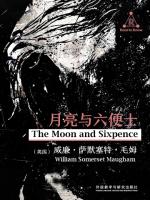Book Review of The Moon and Six Pence
The Moon and Six Pence is written by William Somerset Maugham in 1919. Maugham’s masterpieces are widely praised because of his sharp, incisive and objective style. This book is a novel based on French painter Paul Gauguin, while the hero Charles Strickland is not only a copy of Gauguin, but also added in Maugham’s own inspiration. Therefore, Strickland is actually an individual and new character.
This novel illustrates the latter half of Charles Strickland’s life, who became a well-known and wonderful artist after he died. He was an ordinary successful stockholder at first, but one day he suddenly gave up his happy and perfectly satisfactory family, leaving his beautiful wife and two cute children. He gave up his monotonous but affluent life so firmly. The reason is, quite unexpectedly, that he wanted to live alone and paint attentively. The novel consists of two parts: the first part is about Strickland’s life in London and Paris, which is told in typical narration; the second part is about his life after he left Paris. Strickland’s life track in this part was introduced and told by some related persons in flashback narration, as he had already died and the narrator can only scrape his life together little by little. Such structure makes the novel very fascinating, because readers will be curious all the time until they finish reading.
Maugham was successful in creating the characteristic of Strickland and making me hate him. His obstinateness, determination, loneliness and pride impressed me a lot. Admittedly he is such a genius. But on the other hand, he seems to be too selfish and cool. He is an egocentric bastard, which is accurately the kind of person I really dislike. But it’s strange and subtle that we may not regard him as a normal person. He is outstanding, and it seems that such standards in public morality are never applied to him. Another character who has really attracted me is Stroeve. He is a paint-lover without any talents. He noticed the great gift of Strickland, believed that he will become a wonderful master, and helped him really selflessly. He seemed completely different from Strickland: he is kind, warm-hearted and mild, also kind of silly. But at the same time, he is as stubborn, determined and lonely as Strickland. To some extent, he is a genius, too. He recognized the uniqueness and excellence of Strickland, helped him willingly, even though he himself almost lost everything because of him. The way I see it, he rather sacrificed himself for helping Strickland, not just because of his wife or his kindness. An important element was his belief and loyalty for art, which was the same as Strickland. The corn difference between them was gifts in painting. The gifts were so mysterious. They may be determined by the fate. As a genius without talents, Stroeve’s life wass desperately pathetic and sad.
The novel has a sense of authenticity. Maugham is really expert in shaping characters and telling stories. I’ve doubted for so many times during reading whether the story is fictional or not. It is so lively that I completely believe the whole story. That’s maybe because Maugham is observing and feeling the world so carefully and precisely.
As regards the key idea, in my opinion, it is about following your heart despite the environment and surroundings. Sometimes we have to give up what we really love, in order to be social and accepted. We are lived with so many standards and rules, because of which we are not free. We compromise to the society too much. As Oscar Wilde said, “we all live in the gutter, but some of us are looking at the stars.” We may not brave enough to run counter to the whole world like Strickland. But at least, we shouldn’t forget our sincere dream: what we really want to do and who we really want to be.
This book reminds me of a Chinese play Sunrise by Cao Yu. That play is about a beautiful and gregarious girl Chen Bailu. The two stories have similar subjects. By comparison, they have different method to express the subject. Sunrise is easier to understand, and the protagonist’s thought is more straightforward and clear. After reading Sunrise, you will simply get sad and show sympathy for Chen. Your emotion and thinking come natural. However, after reading The Moon and Six Pence, you will be ambivalent and silent.
The book is really worthy of reading and deep thinking.



 京公网安备 11010802032529号
京公网安备 11010802032529号